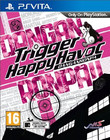It was a tale like any other. Boy meets girl. Boy likes girl. Girl might feel the same way - but before he gets to find out, both get trapped in a mysterious school that has a psychotic murderous teddy bear for a headmaster, who forces the pupils to kill each other if they want to see the outside world ever again.
This, is Danganronpa: Trigger Happy Havoc, the heavily story driven, and just that little bit crazy "visual novel" from Spike Chunsoft, the creators of similarly themed 999: Nine Hours, Nine Persons, Nine Doors, and the equally brilliant Virtue's Last Reward. A PS Vita exclusive that, despite the name, has oddly little to do with triggers, this is a very different sort of game to the usual high octane shooters. A kind of "choose your own adventure" novel mixed with a sprinkling of the court cases and logic busting of Phoenix Wright, and even a pinch of rhythm action game, this is an incredibly well written, roller-coaster ride of a tale that'll have you up until the early hours of morning, because you can't wait to find out what happens next.
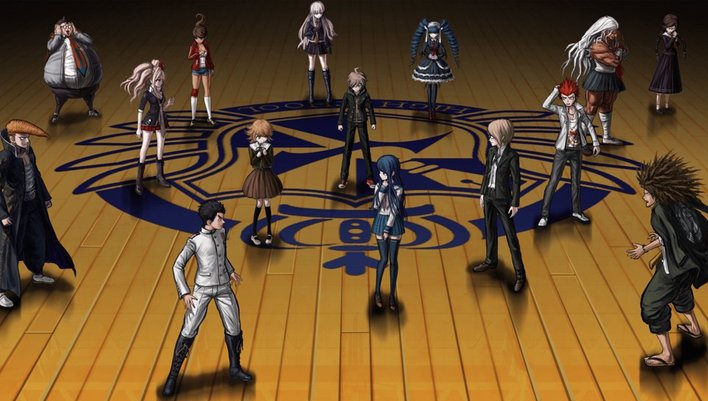
The crew.
At a time where the big AAA games rarely seem to care about character development beyond putting a gun in a guy's hand and giving him an excuse to shoot at some things, Danganronpa is a breath of fresh air, as every single one of its characters has a believable personality of their own - something essential in a game like this.
You play as Makoto Naegi, a rather ordinary, non-exciting, non-spectacular student who's set to start attending a school for the anything but ordinary. You see, Makoto was the "lucky" student who won a lottery to attend Hope's Peak Academy, a school for the elite of the country's elite. Everyone else who's admitted is brilliant at something - or as the game puts it, the "ultimate" - with 14 of the brightest young minds in the country being selected alongside Makoto. There's Celestia Ludenberg, the Ultimate Gambler, a straight faced gothic lolita who's got the world's best poker face; the straight laced and incredibly serious Kiyotaka Ishimaru, who's known as the Ultimate Moral Compass; the pretty yet stereotypical Junko Enoshima, otherwise known as the Ultimate Fashionista, and even the somewhat rotund Hifumi Yamada, who's earnt his place by being the "Ultimate Fanfic Creator". They're joined by Sakura Ogami, the Ultimate Martial Artist, whose heavily muscle bound appearance means she's often mistaken for being a man, and Mondo Owada, the Ultimate Bike Gang Leader, amongst several others.
But no matter what their ultimate talent, each of the students soon find themselves cut down to size, as they're plunged into a nightmare on their very first day at school. Passing out as soon as they enter the main hall, each of the students re-awakes in a room that looks somewhat different to before. With the windows bolted over, and all contact with the outside world cut off, it doesn't take long before they realise they're trapped - and soon a mysterious black and white teddy bear, known as Monokuma appears on a screen, where he explains what's going on - at least, in his twisted mind.
Apparently trapping the students inside the school "for their own safety", the group's faced with a terrifying decisions. Should they wish, they can choose to live together as a unit, trapped inside the school for the rest of their lives, where they will be fed, watered, and clothed, so long as they can live without ever seeing the outside world, and those they've left behind, ever again. If they want to get out, it's easy enough - all they have to do is graduate - but how they do that is harder than simply passing a test. If they want to escape, they have to kill another pupil, and not get found out during the "class trials" that follows, where the pupils come together to cast their verdict on who-dunnit. If the class chooses correctly, the "blackened", who committed the murder, will be killed. If not, every other pupil will die, and the blackened will walk free.
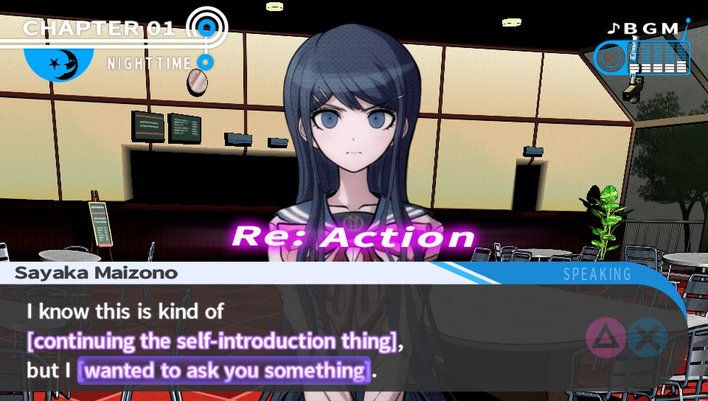
Sometimes, you get the chance to choose different branches through conversations, but it has no effect on the story.
It's a pretty horrific concept, and one the game handles incredibly well, with a suffocating sense of foreboding weighing over your time in the school. As each of the pupils slowly starts to come to grips with the reality of their situation, you'll be glued to each of the conversations, as you mash X, desperate to keep the story moving forward, in the hope that things may start to look up, and you might be able to find a way out. Balanced with plenty of light hearted humour (another rarity in games), it creates a really weird contrast, that gives everything an almost playful feel.
But before you know it, one by one, the students start dropping like flies.
A game of lies and subterfuge, as the evil Monokuma does his best to plant the seeds that'll encourage the students to turn against each other, bonds are formed and broken, and the students have to come to terms with the brutal murder of fellow class mates time and time again. It's a story that moves at an incredible pace, yet is always easy to follow, as the students struggle with their trust, trying to convince themselves that simply staying within the school forever is an option, and that no-one left could ever kill someone - but you never see the next murder coming.
After the first murder's happened, the game switches pace a little, and rather than simply moving from one dialogue bit to the next, you're free to explore the school, as you put your detective hat on and try to figure out exactly what happened. We won't go into too many details here, as we want to avoid spoilers, but if you've ever played Phoenix Wright, you'll know what to expect. Presented with the scene of the crime on the screen, it's up to you to poke anything that looks of interest, as you comb for clues, and anything else that might give you any hints. Slowly, with the help of your fellow students, you'll start to piece together an idea of what happened - but there are plenty of red herrings for you to trip over on the way. As with any good murder mystery, nothing is ever as it seems - and the twists that lie in store for you here are almost impossible to see coming.
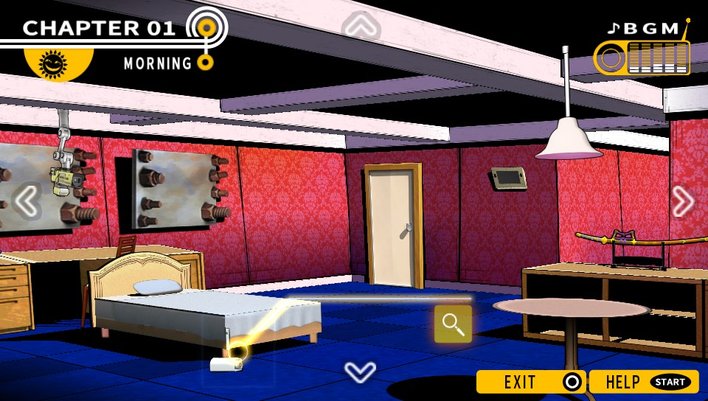
Look around the room for clues!
Once you've sufficiently gathered your evidence, it's off to the class trial, where Monokuma gets to enjoy watching what little trust each of the students had for each other slowly get torn apart. By the time you've got to the class trial, you'll usually have a pretty good idea in your head who-dunnit, and your classmates, having taken the bait hook, line and sinker, will assume it's someone else. With everyone's lives on the line, this is your chance to turn their thinking round, and prove beyond a shadow of a doubt who the guilty party is - but how you go about doing that is a little bit strange.
Each of the pieces of evidence, or facts you deduced from the scene of the crime here become "truth bullets", which you can use to "shoot" through, and shatter the testimonies of the other students. Set in a kind of repeating loop, which you can go through as many times as you want, each of the students will say what they think happened, with the words appearing on screen in a massive font, with words in yellow being potential weaknesses. The only problem you have is that you have to find the right words to shoot - and use the right truth bullet to shoot them with. On easy, that's about all you have to worry about - but on harder difficulties, things are made even more complex thanks to "white noise", where random, non related sentences (in purple) will spin around over the words you're trying to shoot at. Luckily, these can be knocked out of the way by either using the rear touch screen to tap them (which is tricky), or using the left analogue stick to move your cursor, before pressing square to destroy the white noise (which is easier), and triangle to fire the bullet of much truth +4, but it's a mostly unwanted distraction.
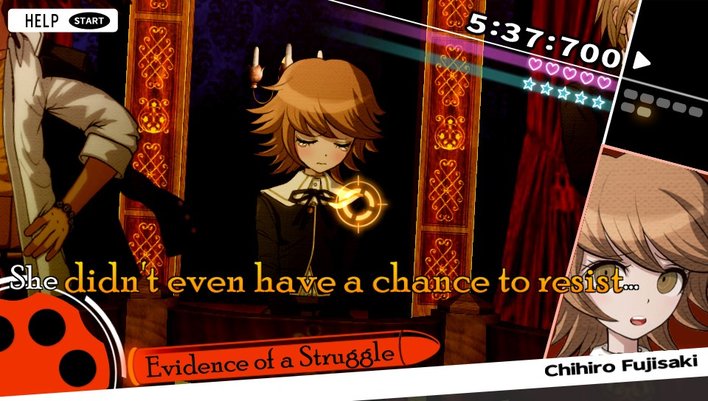
Destroy your opponents with words of truth.
Danganronpa is one of the few games that lets you choose separate difficulty settings for both the "puzzles" and the "action" parts of the games. Set action to easy and puzzle to hard, and while you'll be presented with plenty of brain teasers during the trials, with more options to choose from, and more complex contradictions to spot, you won't have to worry about white noise getting in your way. What you will have to worry about, though, is the initially confusing ability to take the words people say, and turn them into a truth bullet, which you can then fire back against them. While it sounds simple enough, it's sadly not all that logical in practice, as it's never really made clear when you need to do it. Sometimes you'll have to take the very last thing said in the loop, and then wait for the loop to repeat so you can use it against a testimony from earlier on, which requires more than a little bit of thinking in game logic rather than real life logic. Still, complaints like this are mercifully few and far between.
Unfortunately, though, Danganronpa also sometimes suffers from a problem common to similar games, like Phoenix Wright, where often it's not entirely clear which truth bullet you're supposed to be using - not because none of them seem to contradict the testimony, but because several do, and you can't tell which one to use. Adding a bit of unwanted guess work into an otherwise very intelligent game, it puts a bit of a downer on the otherwise gripping class trials.
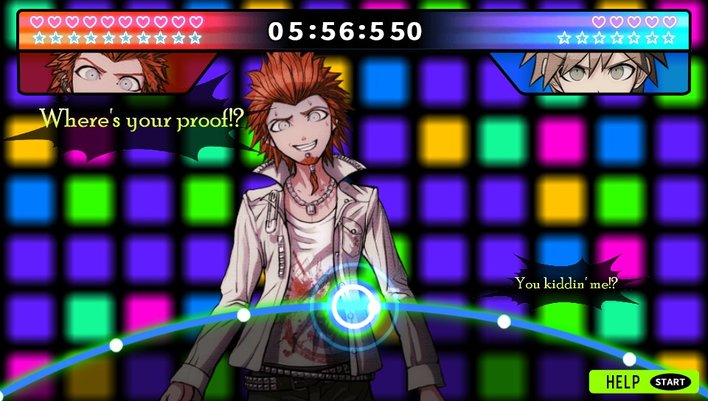
A rhythm action courtroom sim. Yep.
Once you really start to make some headway in the trials, you'll go into a bizarre "rhythm action" style segment, where you have to press buttons in time with a tune/marker at the bottom of the screen to shatter their argument once and for all. It's incredibly weird, but thankfully not all that hard to pull off. What's trickier are the "hangman's gambit" phases, which seem to pop up randomly once per trial, and have you trying to solve an anagram by shooting at letters. The only problem is, half of the letters are fake, and there's only ever three displayed on screen at once anyway. If you don't know what the mystery word is (which usually relates to a key piece of evidence, like "knife" for example), you'll be stumped here - although you can usually have a good guess from the preceding back and forth during the trial.
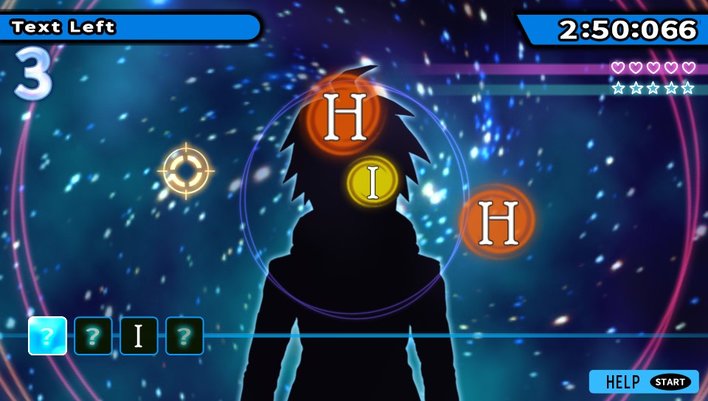
Ship? Ihip? Hiip?
Once you've solved the trial successfully (and you can't actually get it wrong - if you get a game over, the trial restarts simply restarts from where you left off), it's back to your "normal" life in the school, as you look for a way out, explore the school, and get to know the other pupils better. After each murder, a new floor of the school will open up, giving you plenty of new territory to look around during your "free time", which you can also use to talk to your fellow students. Get to know them better by choosing to hang out with them, and you'll not only unlock more information about them and their back-story (helping fill out their in game report card), but you'll also unlock a power that'll help you out during the trial. Whether it's slowing down the speed of the text, or giving you more letters during the anagrams, the powers can be incredibly helpful, if you equip the right ones - so it makes sense to talk to a wide variety of people. Part dating game, you can only actually get to know the characters fully if you give them gifts that they might actually like - gifts which you can buy from the school's special lucky capsule machine, using coins you've collected by searching the rooms. It's all very weird, but then again, so's the rest of the game.
But for all it gets right, Danganronpa has one problem that, while it won't affect your enjoyment of the game, can certainly take the wind out of your sails at just the wrong moment. It has a pretty poor ending. While there's plenty of twists that you'll never see coming, the ending doesn't really answer any of the questions that were raised during the game. While we can't go into any real details without spoiling things, it's probably best you don't have your heart set on a truly eye opening conclusion that ties everything together neatly.
Perhaps equally disappointing for fans of similar visual novels is that there's no branching paths through the Danganronpa story. Choosing instead to be one incredibly well paced, singular tale, rather than be several stories wrapped into one, once you've finished Danganronpa, you'll have seen almost everything there is to see, and there's sadly no way you can affect the story. You can't affect who lives and dies, and there is no happy ending where everyone escapes together. People will die, murders will always happen, and despair will spread.
But despite the minor story issues, Danganronpa is still a game that every Vita owner should have in their collection. With characters you'll grow attached to, a wicked sense of humour, and a story that will keep you up until the small hours of the morning, this is a masterclass of storytelling that won't let you down until the very, very end (and even then, it's not as bad as it could have been). If you want a real page turner that'll get your brain working, this the one for you - and watch out for the sequel, coming out later this year.
Format Reviewed: PS Vita


